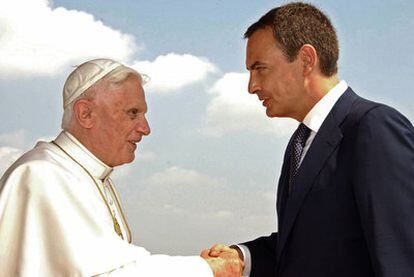Pope's visit ruins August vacation for Madrid public employees
Regional and city governments offer facilities for World Youth Day attendees
For the past week, Soledad (not her real name) has been very upset. She is a custodian at a school in Coslada and works in shifts with three other people. None of the four know who will have to stay and work in August.
"We are not pieces of furniture, you know. They can't change our working conditions from one day to the next," she says, angrily.
Last week, some 275 schools throughout the Madrid region received instructions that they will have to be open to offer lodgings to the followers coming to see Pope Benedict XVI during his visit to the Spanish capital, where World Youth Day (WYD) will be held from August 15-22.
The Spanish government is calling the pope's visit "an exceptional event of public interest," and employing all agencies for support. Schools, public lodges and sports and recreational centers will remain open, with at least one public worker in charge during that week.
Neither the municipal police nor the employees at Samur emergency and civil protection service will be able to take that week off. Like it or not, the pope's visit requires public workers to be on call - but not everyone is accepting this.
Signatures are being collected at schools to protest the Madrid regional government's directive. Labor union CCOO has also sent a letter of complaint. School principals and directors have refused to give up their summer vacation and even lodged protests with the Madrid government's education department, saying that their facilities should not be used for such an event.
CCOO has said that custodians, who will be the only officials on duty and will get paid for a normal shift, cannot be put in charge of the schools. Union representatives have also stressed that vacations must be mapped out three months in advance. At some public schools, such as in Rivas and Getafe, teachers have also started a petition against using the facilities for a religious celebration.
Begun by the late Pope John Paul II in 1985, WYD is held every two or three years in different cities around the world to promote Catholicism among young people. In a statement that accompanies the petition, the teachers say that it is "worrisome" to put "public resources paid for by all citizens at the disposal of private interests."
The regional government's education department denies that they have received any complaints. But sources at Adimad, the association of directors of public facilities, say there has been a lot of fuss.
According to the directive issued by the Madrid regional government, headed by Esperanza Aguirre of the Popular Party (PP), all the public facilities "will be closed at 10.30am and opened at 10.30pm, when the janitor isn't on duty."
"Besides the janitor, there will be a group of volunteers - at least three for every lodging - who will be assigned by the dioceses," reads the directive.
According to FERE, the Catholic federation that oversees religious schooling, the cleaning costs and salaries for the custodians will come from the centers' own budgets. Around 400 youths are expected to be put up at each facility. Since January workers at Samur knew that their August vacation was in jeopardy. In a letter sent to all personnel, the Samur director general said that it would be "impossible to approve vacation days" during that time period.
The Spanish government has given the go-ahead for celebrations of mass at the Cuatro Vientos airport - to be paid for by organizers, according to the prime minister's chief-of-staff office - and the Madrid convention center near to the Santiago Bernabéu stadium.
WYD organizers will get reduced rates for renting the facilities, which will be helped in part by advertising from sponsors. Youths coming from outside the Schengen area will not have to pay for their Spanish entry visas.











































